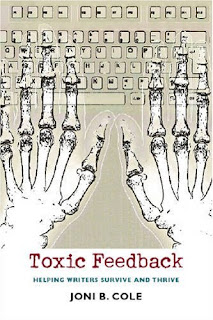Every script is perfect until someone else reads it. It’s
important to put your script in front of your peers to see what they
say about it. Writers groups are a useful tool for that, but keep in mind that
most of the other writers in your group haven't sold any screenplays
either. In fact, you’re likely to learn more about how to improve
your writing by seeing the mistakes in their screenplays than from
the notes they give you on yours.
That's partly because most
people don't know how to give useful feedback, or how to process the
feedback they receive. Focusing equally on both sides of the
equation, Toxic Feedback: Helping Writers Survive and Thrive by Joni Cole solves that problem. Although written with prose authors in
mind, the book’s revelations also apply to screenwriting
groups.
What does Cole mean by “toxic” feedback? If you tell a
person they’re a bad driver, they probably won’t agonize about
whether to turn in their driver’s license. But tell someone their
writing just isn’t there yet and they may abandon the project you
read, or even quit writing altogether. Writers care what people think
of their writing. Providing feedback is very powerful.
Cole gives
great examples of common types of criticism, followed by tips on how
to turn negative feedback into teachable moments. But the bigger
eye-opener of this book is the advice on interpreting
feedback.
According to Cole, 14% of all feedback is dead-on. You
know it in your gut the minute you hear it. You were probably
thinking it subconsciously already and you just needed to hear it out
loud.
Another 18% percent of the feedback you receive is “from
another planet.” It could be because of the feedback provider’s
personal bias; they insist on a happy boy-gets-girl ending even
though the author’s clear intent was boy-gets-boy. Or they insist
you follow some obscure formatting rule that you know is antiquated.
These notes can be disregarded without another thought.
The
remaining 68% fall somewhere in between. You'll consider each of
these notes on a case-by-case basis, weigh them heavier if there was
a consensus from the group, and make the decision whether to make the
change or leave it alone.
It’s important to note that Cole’s
theories leave you empowered with that decision. You’re the boss of
your story, not the feedback provider. Try out the suggestions, but
go with your gut about whether the change makes your script better or
worse. Don’t simply go down the list and make every revision
proposed to try to make everyone like it, because writing by
committee won’t work.
And if you decide not to take a note, it
doesn’t make you any more stubborn than the feedback provider who
stubbornly holds that their notes were “right.”
Whether you
give or receive, if you’re involved in the writing-feedback
process, reading Toxic Feedback is highly recommended.
(A version
of this post was first published on Five Sprockets on June 25, 2012.)

No comments:
Post a Comment